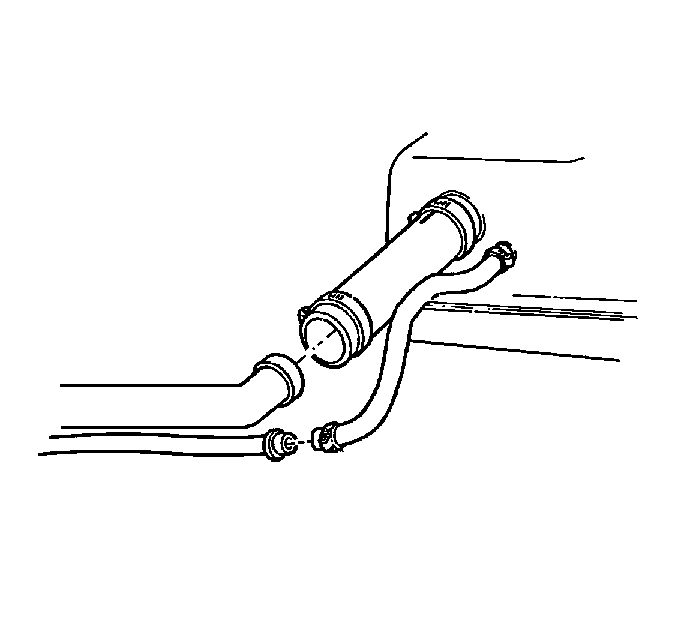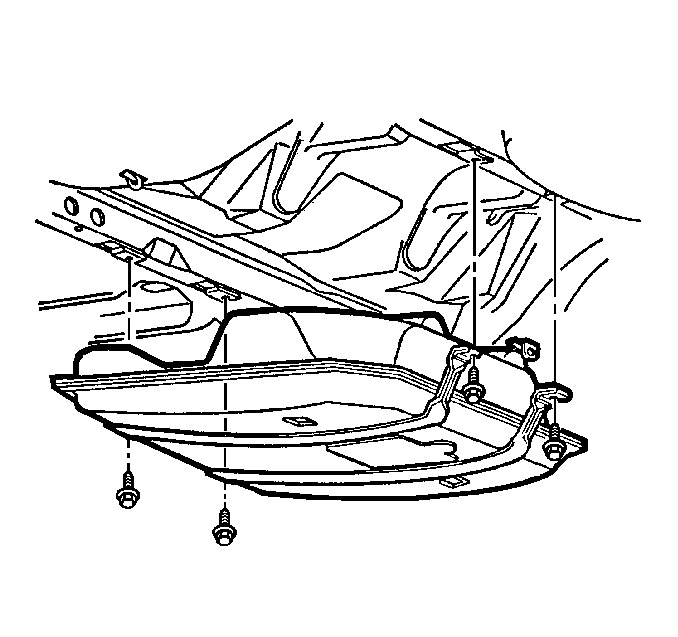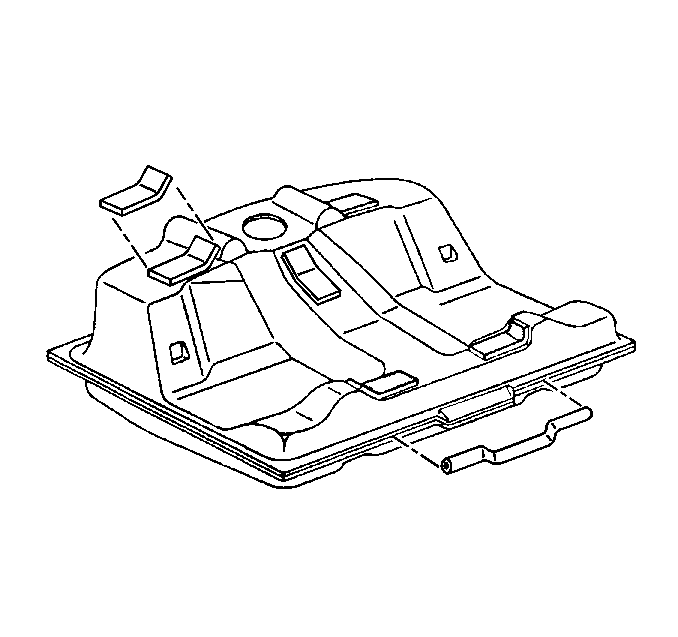Removal Procedure
Caution: Provide additional support when a vehicle is on a hoist:
• Before removing parts, support the opposite end. This helps prevent
the vehicle from slipping off. • Before removing major components, chain the vehicle frame to the
hoist pads at the same end as the removal. This helps avoid a tip-off.
Notice: Do not attempt to straighten any kinked nylon fuel lines. Replace any kinked nylon fuel feed or return pipes in order to prevent damage to the vehicle.
Notice: Cap the fittings and plug the holes when servicing the fuel system in order to prevent dirt and other contaminants from entering the open pipes and passages.
Important: Important do not attempt to repair sections of nylon fuel pipes. If the nylon fuel pipes are damaged, replace them.
Important: Always maintain cleanliness when servicing fuel system components.
- Relieve the fuel system fuel pressure. Refer to Fuel Pressure Relief .
- Drain the fuel tank. Refer to Fuel Tank Draining .
- Raise the vehicle.
- Remove the fuel tank filler EVAP hose from the fuel tank.
- Remove the fuel tank filler hose from the fuel tank.
- Remove the quick-connect fittings at the fuel tank. Refer to Plastic Collar Quick Connect Fitting Service .
- Remove the modular fuel sender, and the fuel tank pressure sensor electrical connectors.
- Remove the EVAP pipe from the connection at the front of the fuel tank.
- Remove the rubber exhaust pipe hangers in order to allow the exhaust system to drop slightly.
- Remove the exhaust pipe heat shield bolts and the exhaust pipe heat shield.
- With the aid of an assistant, support the fuel tank, and remove the fuel tank strap attaching bolts which retain the fuel tank straps.
- Lower the fuel tank enough in order to disconnect the fuel sender electrical connector and remove the fuel sender retaining clips.
- Remove the EVAP pipe to the rear of the fuel tank.
- Remove the EVAP pipe to the fuel sender assembly.
- Remove the fuel tank from the vehicle and place the fuel tank in a suitable work area.
- If the fuel tank is not being replaced, go to Install or Connect.
- Remove the modular fuel sender assembly. Refer to Fuel Sender Assembly Replacement .
- Remove the retaining clip from the EVAP pipe. Note the position of the retaining clip for installation.
- Remove the EVAP pipe from the insulator clips. Note the position of the EVAP pipe for installation.
- Remove the quick-connect fittings at the fuel sender. Refer to Plastic Collar Quick Connect Fitting Service .
- Remove the fuel feed and fuel return pipe assemblies and the insulator clips from the fuel tank.
- Remove the insulator pads from the fuel tank. Note the location of the insulator pads for installation.



Installation Procedure
Notice: Always re-attach the fuel lines and fuel filter with all original type fasteners and hardware.
Do not repair sections of fuel pipes.- Install the insulator pads on the fuel tank.
- Install the insulator clips.
- Install the quick-connect fittings at the fuel sender. Refer to Plastic Collar Quick Connect Fitting Service .
- Install the fuel feed and fuel return pipe assemblies.
- Position the EVAP pipe on the insulator clips as noted during disassembly.
- Install the retaining clip on the EVAP pipe.
- Install the modular fuel sender assembly. Refer to Fuel Sender Assembly Replacement .
- With the aid of an assistant, position and support the fuel tank.
- Install the EVAP pipe to the rear of the fuel tank.
- Install the EVAP pipe to the fuel sender assembly.
- Install the fuel sender electrical connector and the fuel sender retaining clips.
- Install the fuel tank retaining strap attaching bolts (4).
- Install the quick-connect fittings. Refer to Plastic Collar Quick Connect Fitting Service .
- Install the modular fuel sender, and the fuel tank pressure sensor electrical connectors.
- Install the EVAP pipe at the front of the fuel tank.
- Install the fuel tank filler EVAP pipe to the fuel tank.
- Install the fuel tank filler pipe to the fuel tank.
- Install the heat shield and the heat shield attaching screws.
- Install the rubber exhaust pipe hangers.
- Lower the vehicle.
- Add fuel and install the fuel tank filler pipe cap.
- Install the negative battery cable.
- Inspect for leaks.


Tighten
Tighten the front and rear fuel tank retaining strap bolts (4) to 47 N·m
(35 lb ft).

Tighten
Tighten the fuel tank filler pipe hose clamp to 2.5 N·m
(22 lb in).
Tighten
Tighten the fuel tank filler pipe hose clamp to 2.5 N·m(22 lb in).
| 23.1. | Inspect turn the ignition switch to the ON position for 2 seconds. |
| 23.2. | Turn the ignition switch to the OFF for 10 seconds. |
| 23.3. | Turn the ignition switch to the ON position again. |
| 23.4. | Visually inspect the fuel system for fuel leaks. |
